Happiest Medical Specialties for Work-Life Balance
Key Takeaways
- Choosing the right specialty matters – Some fields offer better work-life balance, lower stress, and higher job satisfaction, leading to a more fulfilling career.
- Certain specialties stand out – Dermatology, psychiatry, radiology, ophthalmology, and family medicine provide predictable hours, fewer emergencies, and career flexibility.
- Work schedules vary – Some specialties involve long hours and emergency shifts, while others offer regular office hours and more personal time.
- Shadowing helps – Observing doctors in different specialties gives aspiring physicians insight into daily responsibilities and work environments before making a decision.
“Happiest medical specialties” refers to medical specialties where practitioners report the highest levels of job satisfaction, often due to a manageable workload, low-stress levels, and a positive work-life balance.
Since long hours, unpredictable schedules, and the emotional demands of the job can lead to stress and burnout, medical practitioners must maintain a healthy work-life balance. Choosing a specialty that offers a balance between a fulfilling career and personal life is essential for long-term well-being.
✅ Request information on AUA's MD program TODAY!
YOUR PATH TO SUCCESS BEGINS HERE
In this blog, we will explore the happiest medical specialties, focusing on those that offer a better work-life balance. We’ll also discuss what makes these specialties particularly attractive and why they might be the right choice for aspiring doctors seeking a more balanced lifestyle.
Top 7 Happiest Medical Specialties
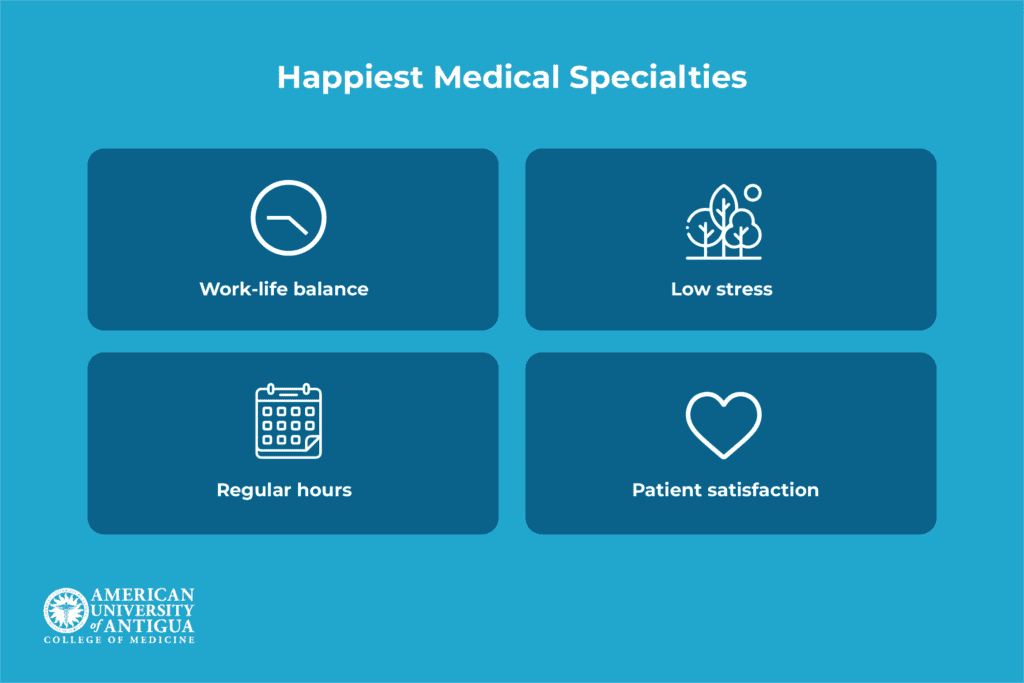
Several medical specialties are known for offering an excellent work-life balance and overall high levels of job satisfaction. These specialties often include regular working hours, fewer emergencies, and less stressful patient care.
Some of the happiest medical specialties include dermatology, psychiatry, radiology, and family medicine. These fields provide opportunities for meaningful work without the intense demands found in other areas of medicine.
In the following paragraphs, we will dive deeper into these specialties, discussing what makes them stand out and why they may be the best choice for doctors seeking a fulfilling and balanced career.
Dermatology
Dermatology is a medical specialty that focuses on diagnosing and treating skin, hair, and nail conditions. It includes common problems like acne, eczema, and psoriasis, as well as more serious issues such as skin cancer. Dermatologists also perform cosmetic procedures to improve the appearance of the skin.
One of the main reasons dermatology is considered a highly satisfying career is the excellent work-life balance it provides. Most dermatologists work regular office hours, with few emergencies, which helps to keep stress levels low. In addition, dermatologists earn a high salary, with an average annual income of $392,900, making it one of the top-paying fields in medicine.
This specialty also offers flexibility, as dermatologists can choose to work in private practice and hospitals or even specialize in cosmetic dermatology, giving them control over their career and lifestyle.
Psychiatry
Psychiatry is a medical field dedicated to diagnosing and treating mental health conditions such as depression, anxiety, and schizophrenia. Psychiatrists work with patients to manage their conditions through therapy, counseling, and medications.
One of the main reasons psychiatry is a satisfying field is the strong work-life balance it offers. Psychiatrists typically have regular office hours with minimal emergencies, which helps keep stress levels low.
The specialty also provides a rewarding experience as psychiatrists often see significant improvements in their patients’ mental health. In addition, psychiatry offers a competitive salary, with an average annual income of $270,141, and provides flexibility in the choice of work settings, including private practices, hospitals, and mental health centers.
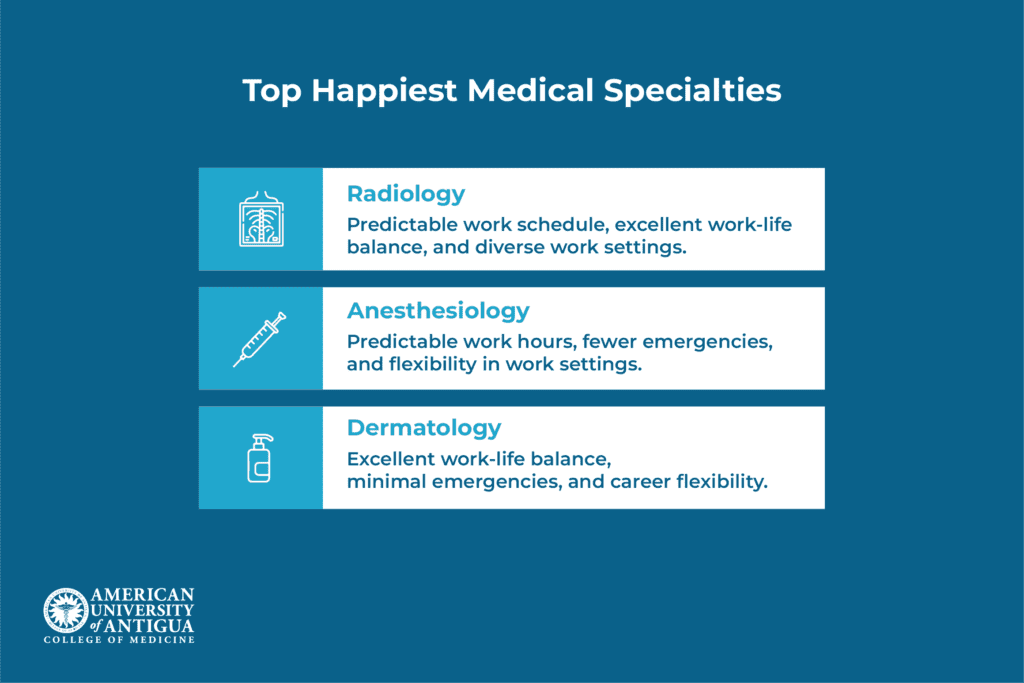
Ophthalmology
Ophthalmology is the branch of medicine that deals with diagnosing and treating eye disorders, such as cataracts and glaucoma, and vision problems, like nearsightedness and farsightedness. Ophthalmologists perform eye exams, prescribe glasses or contact lenses, and often conduct surgeries to improve or restore vision.
One key factor that makes ophthalmology a satisfying career is the great work-life balance. Most ophthalmologists have regular working hours with minimal emergency cases, which helps in reducing stress.
The field also offers a lucrative salary, with an average annual income of $334,729. Additionally, ophthalmologists enjoy flexibility in their careers, as they can work in private practices, hospitals, or specialized eye clinics.
Pediatrics
Pediatrics focuses on the health and care of children, from babies to teenagers. Pediatricians treat many health problems, such as common colds, ear infections, and more serious conditions like asthma or diabetes.
Pediatricians enjoy their careers because of the satisfaction they get from helping children and supporting their growth and well-being. Many pediatricians also have a good work-life balance, with regular office hours and fewer emergencies, which reduces stress.
The specialty offers a solid salary, with pediatricians earning around $229,620 annually on average. They also have the flexibility to work in different places, like private practices, hospitals, or outpatient clinics, allowing them to choose where they want to work.
Family medicine
Family medicine is a medical field that focuses on providing healthcare to people of all ages, from babies to older adults. Family doctors treat a variety of health issues, such as regular check-ups, preventive care, and both short-term and long-term illnesses.
One reason family medicine doctors are happy in their jobs is the good work-life balance. They usually work regular hours and don’t have many emergencies, which means less stress.
The salary is also good, with family medicine doctors earning around $233,713 a year on average. Plus, family medicine doctors have the flexibility to work in different settings, such as private practices, hospitals, or community health centers.
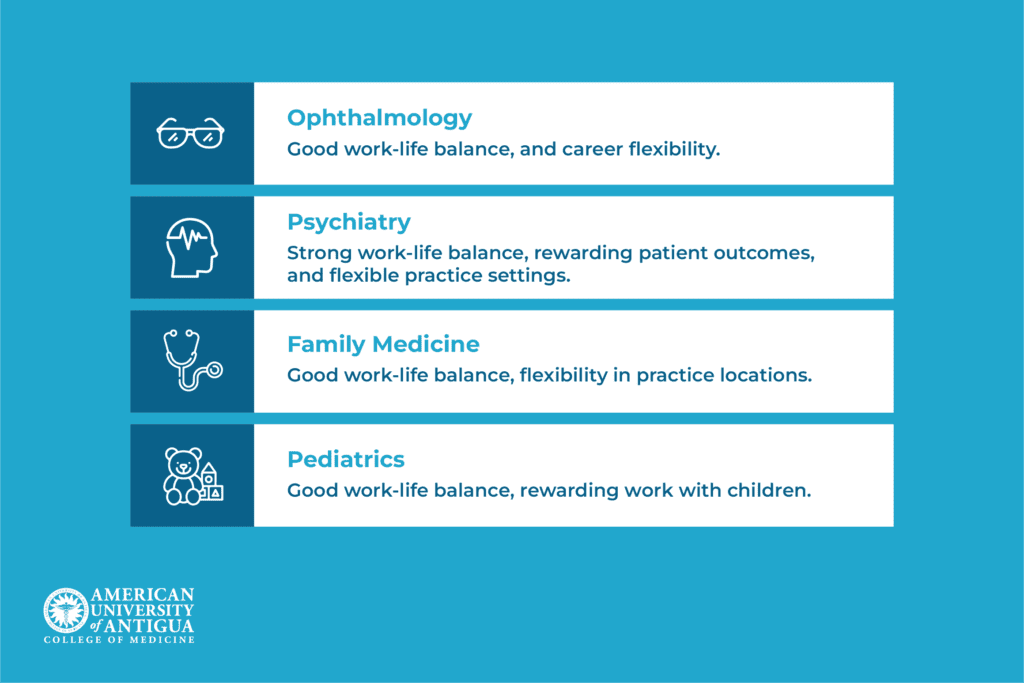
Radiology
Radiology is the medical specialty that focuses on using imaging technologies such as X-rays, CT scans, MRIs, and ultrasounds to diagnose and treat various medical conditions. Radiologists interpret these images to help identify injuries, diseases, and other health issues.
Job satisfaction in radiology is high due to factors like a predictable work schedule, with many radiologists working regular office hours and minimal on-call duties. This allows for a good work-life balance, reducing stress compared to specialties with more emergency situations.
The specialty also offers a high salary, with radiologists earning an average annual income of $468,390, making it financially rewarding. Additionally, radiologists have the flexibility to work in diverse environments, including hospitals, private practices, and outpatient centers, allowing them to choose a setting that suits their preferences.
Anesthesiology
Anesthesiology is a medical specialty where doctors administer anesthesia to patients before, during, and after surgeries or medical procedures. Anesthesiologists make sure patients are safely asleep and pain-free while carefully watching their vital signs during the procedure.
Job satisfaction in anesthesiology comes from predictable work hours, as many anesthesiologists work on scheduled shifts with fewer emergency situations than other specialties. This helps them manage stress and maintain a better work-life balance.
The field also offers a high salary, with anesthesiologists earning an average annual income of $439,200. Additionally, anesthesiologists have the option to work in different places, such as hospitals, surgical centers, or private practices, giving them more flexibility in their careers.
How to Choose the Best Medical Specialty for You
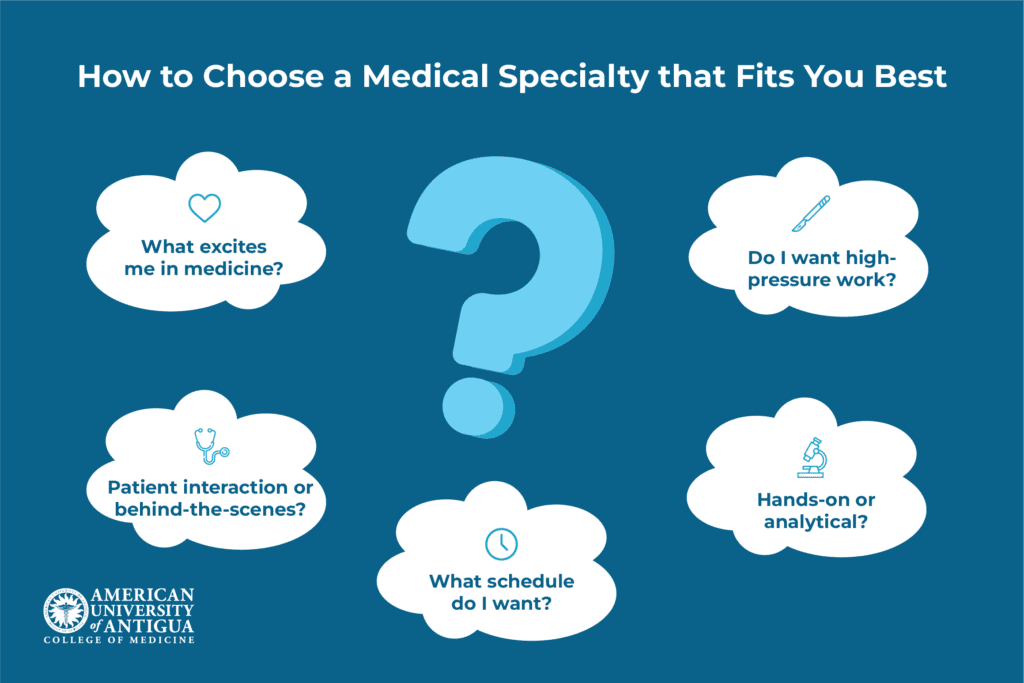
Picking the right medical specialty is an important decision that should be made based on your personality, interests, and future career goals. It’s important to think about what excites you in medicine—whether it’s working closely with patients, performing surgeries, diagnosing complex diseases, or perhaps focusing on prevention and wellness.
Reflecting on your values and what type of work environment you enjoy can help guide your choice. For example, some specialties require more patient interaction, while others might involve more behind-the-scenes work, like interpreting medical tests or analyzing data.
Another important factor to consider is the variation in work schedules across different specialties. Some fields, such as emergency medicine or surgery, may involve long hours, being on call, or shift-based work. This can mean irregular hours, weekends, and the pressure of dealing with urgent situations.
On the other hand, specialties like dermatology, radiology, or family medicine often offer more predictable, 9-to-5 schedules, giving doctors more flexibility and control over their time. It’s important to consider what kind of schedule fits your lifestyle and personal preferences.
Lastly, it’s highly recommended that aspiring doctors shadow professionals in different specialties before choosing a specialty. Shadowing allows you to observe firsthand what a typical day looks like for doctors in various fields. It can help you gain a better understanding of the day-to-day responsibilities, the challenges, and the rewards of each specialty.
By spending time with doctors in real clinical settings, you’ll be able to see how each specialty aligns with your interests and lifestyle. It’s also a great way to build connections and gather insights that can help guide your decision-making process.
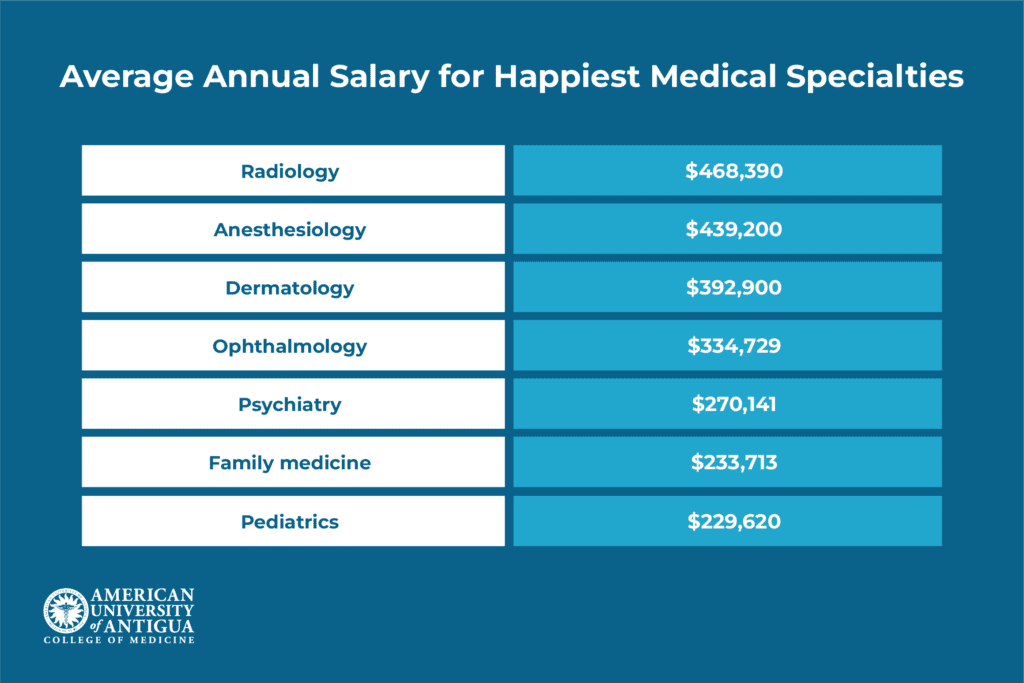
Conclusion
Choosing a medical specialty with a good work-life balance is important for long-term career satisfaction and personal well-being. Specialties like dermatology, psychiatry, radiology, and family medicine offer structured schedules, lower stress, and greater flexibility, allowing doctors to maintain both a rewarding career and a fulfilling personal life.
By considering factors like work hours, job demands, and professional interests, future doctors can find a specialty that suits their lifestyle and career goals. Shadowing professionals and researching different fields can also help in making an informed decision.
Choosing the right medical specialty is a big decision. Explore how AUAMED can help you prepare for a successful medical career.
Frequently Asked Questions (FAQs):
Which medical specialties allow remote or telemedicine work?
Specialties like psychiatry, radiology, dermatology, and family medicine often allow remote or telemedicine work, as they involve consultations, imaging reviews, and follow-ups that can be done virtually.
What are the most stressful medical specialties to avoid?
Emergency medicine, surgery, and critical care are among the most stressful specialties due to long hours, high-pressure situations, and life-or-death decision-making.
✅ Request information on AUA's MD program TODAY!